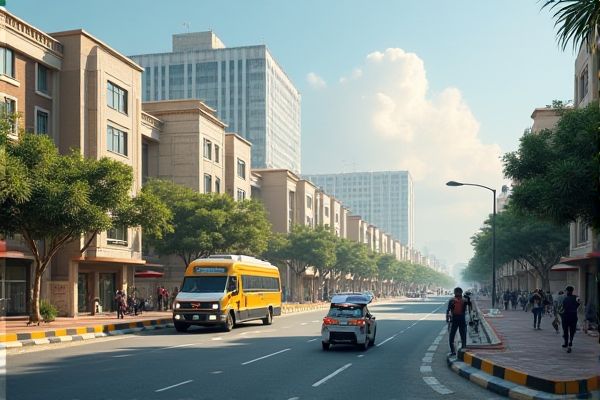
What to know as new resident in India: Cultural diversity and traditions. Language variations. Currency and payment methods. Public transportation systems. Healthcare and insurance. Local cuisine and dining etiquette. Climate and weather patterns. Apartment rental process. Safety and emergency contacts. Social norms and practices.
Cultural diversity and traditions
As a new resident in India, you should be aware of the rich cultural diversity and numerous traditions, including unique greetings like 'Namaste', the importance of guests ('Atithi Devo Bhava'), diverse regional cuisines, and various festivals such as Diwali, Holi, and Eid. Traditional clothing and dance forms vary significantly across different states and regions. To truly grasp these fascinating elements of Indian culture, exploring insights found on Authentic India Tours can provide a deeper understanding of these vibrant customs and traditions.
Language variations
In India, you will encounter a vast linguistic diversity, with languages broadly classified into four groups: Indo-Aryan, Dravidian, Austro-Asiatic, and Sino-Tibetan. The country has 22 official languages, including Hindi, Bengali, Marathi, and Telugu, each predominant in different regions, and over 270 languages and dialects are spoken across the country. If you're planning to explore this rich cultural tapestry, a Quick Guide to Speaking Indian Languages for Foreign Tourists can be an invaluable resource in navigating the linguistic landscape, allowing you to connect more deeply with the local communities during your travels.
Currency and payment methods
In India, the official currency is the Indian Rupee (INR), with denominations ranging from 5 to 2,000 rupees for notes and 25 paise to 10 rupees for coins. Travelers have various payment methods at their disposal, including widely accepted MasterCard and Visa credit cards, ATMs for easy cash withdrawals, and digital payment options. Among these, the innovative UPI One World wallet stands out, offering international travelers the convenience of making payments without the need for an Indian mobile number or bank account.
Public transportation systems
In India, public transportation is extensive and varied, including a vast network of buses, taxis, auto-rickshaws, and urban metro systems. Buses and trains are primary modes of transport, while taxis and ride-sharing services like Uber and Ola are common for shorter distances. The Metro Systems in major cities like Delhi, Mumbai, and Bengaluru offer efficient and modern travel options.
Healthcare and insurance
As a new resident in India, it is important to know that all Indian citizens can access free outpatient and inpatient care at government facilities, but due to shortages, many opt for private care. The government's National Health Protection Scheme, known as Ayushman Bharat-Pradhan Mantri Jan Arogya Yojana, provides cashless secondary and tertiary care for low-income families, and various insurance schemes, including private and public options, are available with different coverage and eligibility criteria. For more comprehensive details on healthcare in India, you can visit the International Health Policy Center on the Commonwealth Fund's website.
Local cuisine and dining etiquette
When dining in India, it is customary to use your right hand, share food from serving dishes, and finish all the food on your plate, honoring the tradition of not wasting food. Complimenting the host on the meal is both a gesture of appreciation and a reflection of the flavorful culinary traditions of the country. According to The Culture Trip, it is also important to wait for the host or elder members to finish eating before leaving the table, demonstrating respect and good manners, which are highly valued in Indian culture.
Climate and weather patterns
India's climate is diverse, with a Tropical Savanna Climate prevailing in most of inland peninsular India, characterized by long dry winters and summers, a hot and humid monsoon season from June to September, and significant regional variations in temperature and rainfall. The country experiences extreme weather conditions, including severe heatwaves, floods, and droughts, which are exacerbated by Climate Change.
Apartment rental process
As a new resident in India, particularly for Non-Resident Indians (NRIs), the apartment rental process involves drafting a comprehensive rental agreement that includes terms like rent, security deposits, tenant background checks, and specific lease clauses. The agreement must include the PAN numbers of both the owner and the tenant, and NRIs can use power of attorney or online services to facilitate the process remotely.
Safety and emergency contacts
As a new resident in India, ensure your safety by wearing seatbelts, helmets, and avoiding night driving. Keep important emergency numbers handy, such as 112 for national emergencies, 100 for police, 101 for fire, and 102 for ambulances, and carry contact information for the nearest US embassy or consulate. For comprehensive guidelines and recommendations, the CDC Travel Website offers valuable information to help navigate your stay safely and efficiently.
Social norms and practices
As a new resident in India, it is crucial to dress modestly, avoid public displays of affection, respect elderly individuals by offering them your seat, and follow customs such as removing footwear before entering homes or places of worship. Additionally, using respectful greetings like "Namaste," avoiding the use of the left hand for interactions, and maintaining hygiene practices like washing hands before meals are important social norms to observe. For more detailed insights on this topic, visit the Etiquette and Faux Pas in India for Travelers page. Embracing these customs helps in ensuring a respectful and culturally sensitive experience while residing in India.
